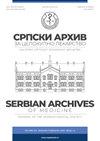Comparison of Delta and Omicron variant of COVID-19 infection cases in Montenegro
IF 0.2
4区 医学
Q4 MEDICINE, GENERAL & INTERNAL
引用次数: 0
Abstract
Introduction/Objective. At the end of 2021, Omicron wave (B.1.1.529) SARS-CoV-2 variant superseded the Delta variant (B.1.617). The main goal of the research is to provide a detailed and comprehensive presentation of data related to people infected with the coronavirus in Montenegro. The specific goal of the research is to determine whether virus mutations influenced the course of the epidemic during its two-year duration. Methods. This is a retrospective study. We used data from the Institute of Public Health of Montenegro. Our sample consisted of 127 134 people who tested positive for Delta or Omicron infection aged 0-100 years, who had a positive PCR test for Covid-19 between August 17 2021 and April 17 2022. Results. The respondents aged 40 to 49 years were taken as a reference group for age. The results showed that the age group from 20 to 29 years old was affected 1.03 times more than the reference group - persons belonging to the age group of 30 to 39 years were affected 1.07 times more than the reference group. The Central region was taken as the reference group for the region. The results showed that people who live in southern region got sick 1.14 times more often and people who live in northern region got sick 1.20 times less than people from the central region. Conclusion. The biggest predictor that a person would get sick is the age group. Also, the predictor is the region, and in our research, it was southern region.黑山地区新型冠状病毒感染病例δ型和欧米克隆型的比较
介绍/目标。2021年底,欧米克隆波(B.1.1.529) SARS-CoV-2型病毒取代了德尔塔病毒(B.1.617)。这项研究的主要目标是详细和全面地介绍与黑山冠状病毒感染者有关的数据。该研究的具体目标是确定病毒突变是否影响了流行病在两年期间的进程。方法。这是一项回顾性研究。我们使用了黑山公共卫生研究所的数据。我们的样本包括127134名年龄在0-100岁之间的Delta或Omicron感染检测呈阳性的人,他们在2021年8月17日至2022年4月17日期间对Covid-19进行了阳性PCR检测。结果。年龄为40 ~ 49岁的被调查者作为年龄参照组。结果表明,20 ~ 29岁年龄组受影响程度是参照组的1.03倍,30 ~ 39岁年龄组受影响程度是参照组的1.07倍。选取中部地区作为该地区的参照组。结果表明,南部地区居民的患病几率是中部地区居民的1.14倍,北部地区居民的患病几率是中部地区居民的1.20倍。结论。一个人生病的最大预测因素是年龄组。同样,预测因子是地区,在我们的研究中,是南部地区。
本文章由计算机程序翻译,如有差异,请以英文原文为准。
求助全文
约1分钟内获得全文
求助全文
来源期刊

Srpski arhiv za celokupno lekarstvo
MEDICINE, GENERAL & INTERNAL-
CiteScore
0.40
自引率
50.00%
发文量
104
审稿时长
4-8 weeks
期刊介绍:
Srpski Arhiv Za Celokupno Lekarstvo (Serbian Archives of Medicine) is the Journal of the Serbian Medical Society, founded in 1872, which publishes articles by the members of the Serbian Medical Society, subscribers, as well as members of other associations of medical and related fields. The Journal publishes: original articles, communications, case reports, review articles, current topics, articles of history of medicine, articles for practitioners, articles related to the language of medicine, articles on medical ethics (clinical ethics, publication ethics, regulatory standards in medicine), congress and scientific meeting reports, professional news, book reviews, texts for "In memory of...", i.e. In memoriam and Promemoria columns, as well as comments and letters to the Editorial Board.
All manuscripts under consideration in the Serbian Archives of Medicine may not be offered or be under consideration for publication elsewhere. Articles must not have been published elsewhere (in part or in full).
 求助内容:
求助内容: 应助结果提醒方式:
应助结果提醒方式:


